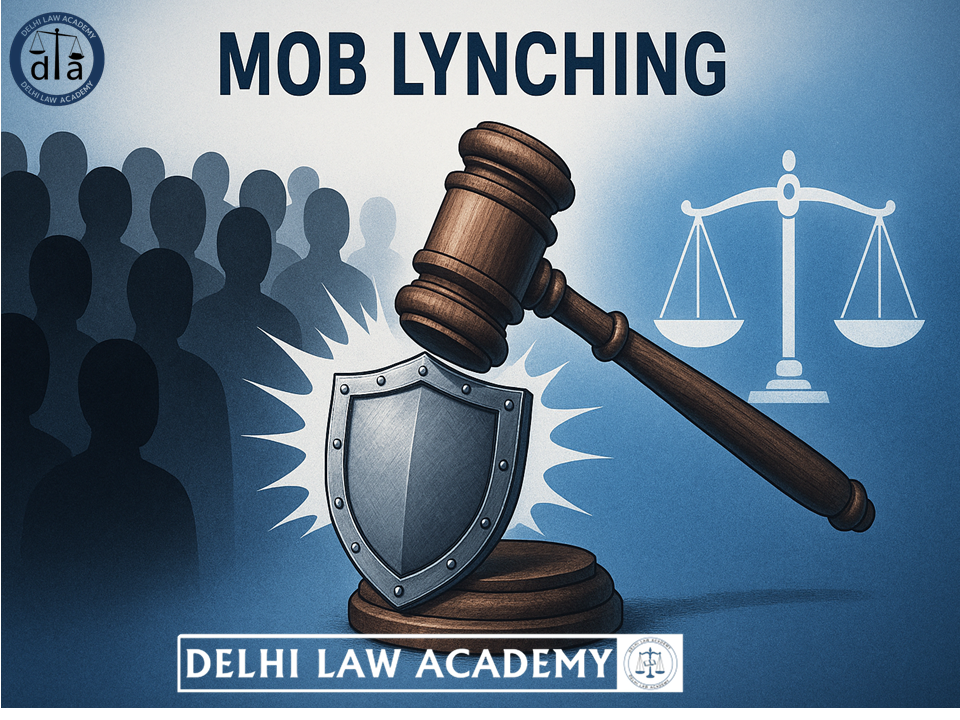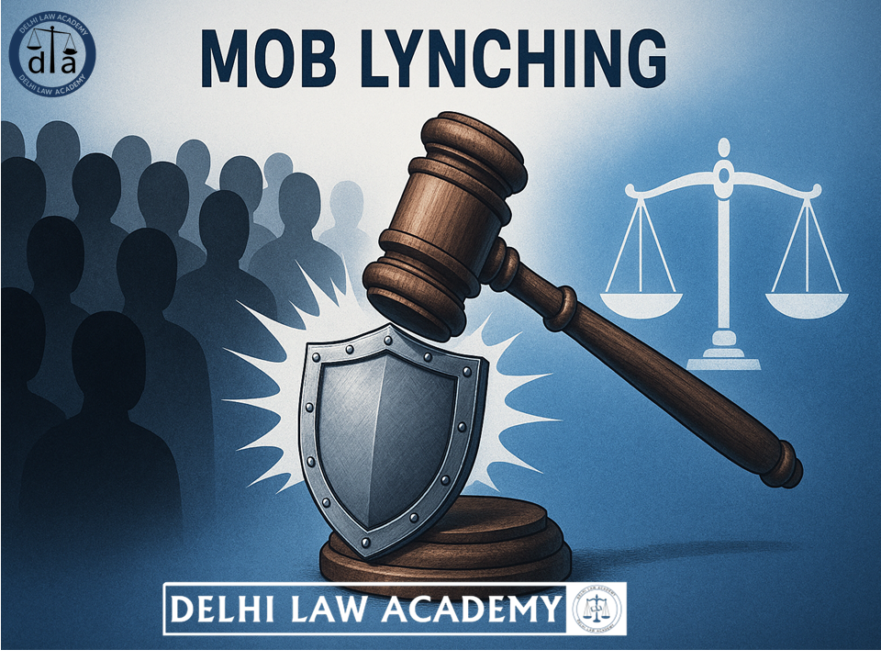
⚖️ Mob Lynching under BNS 2023: A Landmark Legal Reform
India’s criminal law has evolved significantly with the introduction of the Bharatiya Nyaya Sanhita (BNS), 2023 📜, replacing the colonial-era IPC. Among its many reforms, the recognition of mob lynching as a separate offence under Section 103(2) is one of the most critical. This blog explores what mob lynching is, how BNS treats it, and why it is important for law students, aspirants, and society at large.
📖 What is Mob Lynching?
Mob lynching refers to situations where a group of people, often five or more 👥, acts together to commit violence or murder against an individual or community based on bias, prejudice, or personal beliefs. Until 2023, such incidents were prosecuted under general IPC provisions like murder (Section 302), rioting (Section 147), or unlawful assembly (Section 141). While punishable, these laws did not recognise the collective and hate-driven nature of mob violence.
📝 Section 103(2) of BNS: Key Highlights
Under BNS, Section 103(2) states:
“If five or more persons act together to commit murder 🔪 on the basis of caste, religion 🕉️✝️☪️, community, language 🗣️, personal belief 🧑🤝🧑, or similar grounds, it shall be treated as the offence of mob lynching.”
This provision officially recognises mob lynching as a distinct and punishable crime. It ensures that such incidents are treated with the seriousness they deserve and provides legal clarity for law enforcement and the judiciary.
⚖️ Why This Reform Matters
- 1️⃣ Legal Clarity: Law enforcement 👮♂️ and the judiciary 👩⚖️ now have a clear framework for investigation and prosecution.
- 2️⃣ Protection of Human Dignity: Ensures individuals’ rights and dignity are safeguarded 🙌.
- 3️⃣ Promotion of Social Harmony: Recognises that hate-driven collective violence harms society 🤝.
- 4️⃣ Deterrence: Provides stricter punishments 🚫 and sends a strong message to potential offenders.
🌐 Difference Between IPC and BNS
Before BNS:
- Mob lynching was prosecuted under general sections: murder 🔪, rioting 🪧, or unlawful assembly 👥.
- Lacked recognition of collective and targeted nature of the crime.
With BNS:
- Mob lynching is a clearly defined offence ✅.
- Ensures proper accountability and proportional punishment.
- Reflects modern societal realities and human rights principles.
🌟 Impact on Society and Legal Education
The inclusion of mob lynching as a separate offence under BNS has multiple implications:
- Strengthens public confidence in the legal system 🏛️.
- Equips law students 🎓 and judiciary aspirants with up-to-date knowledge on legal reforms.
- Encourages societal awareness 🧠 about the consequences of collective hate-driven violence.
💡 Conclusion
Mob lynching is a complex social problem, but the BNS 2023 provides a powerful legal tool to combat it ⚖️. Legal awareness, strict enforcement, and social education are all necessary to ensure a safe, just, and inclusive society 🇮🇳.
📚 Further Reading for Law Aspirants
Explore more useful resources from Delhi Law Academy to strengthen your preparation:
❓ Frequently Asked Questions (FAQs) on Mob Lynching under BNS
Mob lynching refers to violence or murder committed by five or more persons against an individual or community based on caste, religion, language, personal belief, or similar grounds. Section 103(2) of BNS explicitly criminalises it.
Earlier, mob lynching was prosecuted under general IPC sections like murder (302) or rioting (147). BNS recognises it as a separate offence, capturing its collective and hate-driven nature for proper legal action.
Any individual who is part of a group of five or more persons committing murder on the prohibited grounds (caste, religion, etc.) can be held criminally responsible under Section 103(2) of BNS.
It aims to ensure legal clarity, deterrence, protection of human dignity, and promotion of social harmony by treating mob lynching as a distinct offence.
Understanding this reform helps law students and aspirants stay updated with modern legal provisions and equips them to interpret laws in real-world social contexts.
Contact us
📍 Delhi Law Academy – Jaipur Branch
6C, Tower 2, Coaching Hub, Pratap Nagar, Jaipur – 302033
📞 Phone:
+91 9911916552
+91 8447285606
✉️ Email:
contactus@delhilawacademy.com

